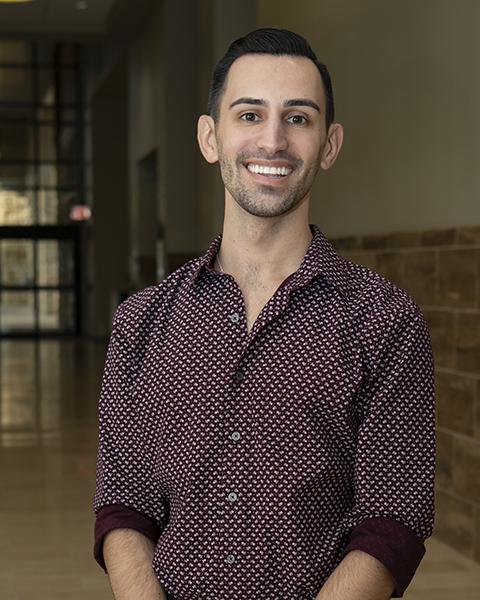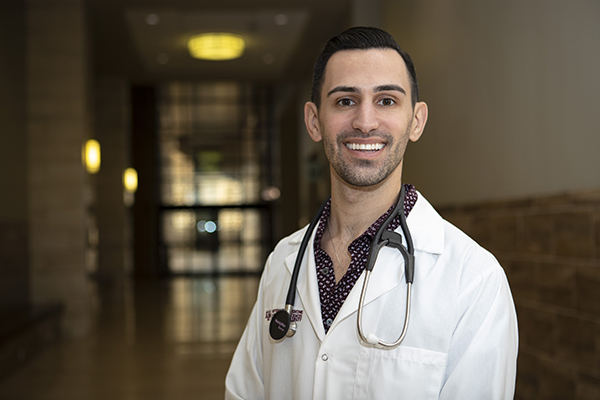Story by Megan Myers
 Alex Golden, a December graduate from the Texas A&M College of Veterinary Medicine & Biomedical Sciences’ (CVM) biomedical sciences (BIMS) master’s program, has always wanted to be a doctor.
Alex Golden, a December graduate from the Texas A&M College of Veterinary Medicine & Biomedical Sciences’ (CVM) biomedical sciences (BIMS) master’s program, has always wanted to be a doctor.
While growing up in New Jersey, Golden developed a love for dance, theater, and the arts, and so he decided to combine all of his passions during his undergraduate education at Rutgers University by majoring in Spanish and double minoring in biology and dance.
“I originally got into the School of Environmental and Biological Sciences, but after talking to the health professions office, they said, ‘You don’t have to be a science major to go to medical school,’” he recalled. “I wanted to do the dance minor because I have always done artistic endeavors and a lot of theater, so I thought that this would be a good break in between my science classes.”
At Rutgers, the connection between art and medicine was reinforced as Golden participated in a research project on dance therapy and Parkinson’s disease at Rutgers’ Aresty Research Center.
“Parkinson’s disease is a chronic, progressive illness that there’s no cure for and the disease involves a loss of motor function over time,” Golden said. “Some research has shown that if someone with Parkinson’s increases their movement repertoire, it might slow down the progression of the disease.”
Working with certified movement specialists who were trained through the Mark Morris Dance Group in New York, Golden saw first-hand the benefits that the therapy offered.
“Not all of the people who come into these therapy sessions had Parkinson’s disease; their caretaker or their spouse would come with them,” he said. “Everyone danced together and you didn’t even know at that point who had Parkinson’s and who didn’t. It was a good atmosphere, the therapy worked, people were happy, and it improved quality of life.”
After graduating from Rutgers, Golden decided to take a year off from school to gain experience as a medical scribe. When his family moved to Austin, he followed and began working at the Baylor Scott & White Medical Center in Round Rock.
“A scribe goes into the clinical appointments with the physician and types the medical note that is going to be kept on file for the patient,” Golden said. “The doctor and the patient can have more one-on-one time and the doctor doesn’t have to really worry about taking the notes.
“I learned everything from the legalities of taking a medical note, to how a physician should interact with a patient, to all the vocabulary and linguistics that are necessary—the specialized language of medicine,” he said.
During his gap year, Golden applied to medical school but didn’t get in, leading him to examine his application for any shortcomings. Deciding that he needed to raise his science GPA, he began looking for a master’s program to help him accomplish that.
“I looked at a lot of programs in New York, New Jersey, and Pennsylvania,” Golden said. “I got into every program I applied to.
“The BIMS program at Texas A&M was the only one I applied to in Texas. I was a little unsure about it, but then after looking into it, that changed,” he said. “After orientation and talking to a couple of people, I knew this program would provide me with the resources I needed to reapply and be successful.”
Luckily, the BIMS master’s program proved to be the perfect fit for Golden.
 “It was really nice to learn about all of the ‘-ologies’ from a broader spectrum,” he said. “There’s a lot of comparative anatomy in this program, since it’s at the veterinary school. You get a more well-rounded view of things that could exist in the animal kingdom and then how you can extrapolate that into human medicine.
“It was really nice to learn about all of the ‘-ologies’ from a broader spectrum,” he said. “There’s a lot of comparative anatomy in this program, since it’s at the veterinary school. You get a more well-rounded view of things that could exist in the animal kingdom and then how you can extrapolate that into human medicine.
“The faculty and staff are amazing; they’re very supportive and helpful,” he said. “They host everything from social to academic to networking events. It really allows you to make of it what you want it to be. You just have to take the initiative, but they supply you with all the tools.”
When it came time to begin applying for medical school again, Golden was pleased to receive an interview invitation for the University of Incarnate Word in San Antonio and then an acceptance only three weeks later.
“I think the most important part of applying to a professional school is getting the interview,” Golden said. “Getting the GPA and the admission test score is up to the individual and essentially what admissions committees use to screen applicants, but the interview is what decides if you’re going or not. It’s what sets you apart from other people and I think that this particular master’s program helps you get that interview.”
Golden plans to pursue a career in osteopathic medicine, which he describes as a holistic approach to medicine that focuses on treating the patient rather than the disease.
“I feel like my personality and my belief system align more with an osteopathic physician,” he said. “I’ve always been an artsy person, so I felt like I never really fit in with more of a typical, 100-percent scientific crowd.
“One of the tenants of osteopathic practice is that disease and pathology arise from a musculoskeletal disorder,” he said. “So, they do these adjustments, manipulations, or massages in certain areas of the body to prevent further injury or harm. I grew up doing competitive gymnastics, so I’ve always done a lot of things with my body, in terms of manipulation and exercise and the musculoskeletal system, so I appreciate that aspect of it.”
He ultimately plans to specialize as an obstetrician-gynecologist (OB-GYN), a career he fell in love with after shadowing his cousin and her husband, both OB-GYNs in New Jersey.
“I think a female population is one that I, as a gay male, would be able to interact with and be received well by the patient,” Golden said. “I think women’s health, in general, is a field that lacks male support, so it’d be nice to have another male advocate out there helping women in this.
“Also, I feel like since I’m not going to be able to have kids the traditional way, I’m going to have to look into IVF (in-vitro fertilization) and other non-traditional methods of having children, like surrogacy and adoption.”
Though his path to medical school may not have gone exactly as planned, Golden is thankful for the experiences he has gained along the way and excited to finally begin his medical program.
“I’m ready to start my career,” he said. “I’m just excited to actually begin learning, so I can practice. I’ve been dreaming about being a doctor forever.”
###
For more information about the Texas A&M College of Veterinary Medicine & Biomedical Sciences, please visit our website at vetmed.tamu.edu or join us on Facebook, Instagram, and Twitter.
Contact Information: Jennifer Gauntt, Interim Director of Communications, Texas A&M College of Veterinary Medicine & Biomedical Science; jgauntt@cvm.tamu.edu; 979-862-4216
